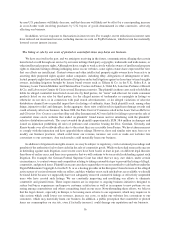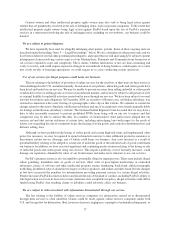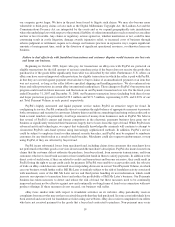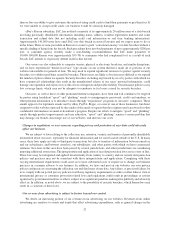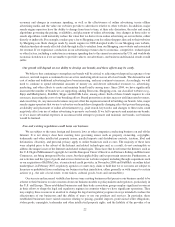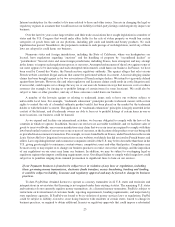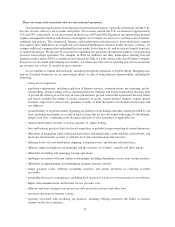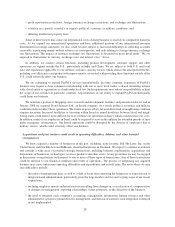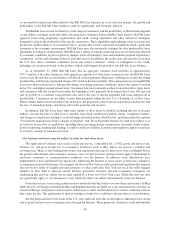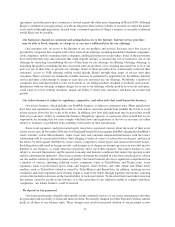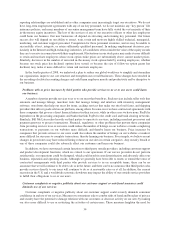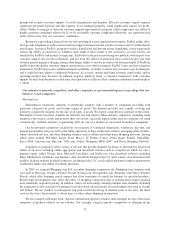eBay 2008 Annual Report Download - page 33
Download and view the complete annual report
Please find page 33 of the 2008 eBay annual report below. You can navigate through the pages in the report by either clicking on the pages listed below, or by using the keyword search tool below to find specific information within the annual report.such local law requires a payment processor like PayPal to be licensed as a bank or financial institution or otherwise.
Even if PayPal is not currently required to obtain a license in some jurisdictions, future localization or targeted
marketing of PayPal’s service in those countries, or expansion of the financial products offered by PayPal to new
jurisdictions (either alone, through a commercial alliance or through an acquisition), could subject PayPal to
additional licensure requirements, laws and regulations and increased regulatory scrutiny. These factors could
impose substantial costs and involve considerable delay to the provision or development of its products. Delay or
failure to receive such a license or regulatory approval could require PayPal to change its business practices or
features in ways that would adversely affect PayPal’s international expansion plans and could require PayPal to
suspend providing products and services to customers in one or more countries.
Our Bill Me Later service is similarly subject to a variety of laws and regulations. Although Bill Me Later does
not originate loans, one or more jurisdictions may conclude that Bill Me Later is a lender or money transmitter or
loan broker, which could subject us to liability or regulation in one or more jurisdictions. Additionally, federal
regulators could mandate changes to the relationship between Bill Me Later and CIT Bank, the financial institution
that Bill Me Later relies on to extend credit to customers with the Bill Me Later service. Any adverse changes in this
relationship could negatively impact Bill Me Later’s ability to continue operating its business as currently
conducted.
Changes to credit card networks or bank fees, rules, or practices could harm PayPal’s business.
PayPal does not belong to or directly access credit card networks, such as Visa and MasterCard. As a result,
PayPal must rely on banks or other payment processors to process transactions, and must pay a fee for this service.
From time to time, credit card networks have increased, and may increase in the future, the interchange fees and
assessments that they charge for each transaction using one of their cards. PayPal’s credit card processors have the
right to pass any increases in interchange fees and assessments on to PayPal as well as increase their own fees for
processing. These increased fees increase PayPal’s operating costs and reduce its profit margins. PayPal is also
required by its processors to comply with credit card network operating rules, and PayPal has agreed to reimburse its
processors for any fines they are assessed by credit card networks as a result of any rule violations by PayPal or
PayPal’s customers. The credit card networks set and interpret the credit card rules. Credit card networks could
adopt new operating rules or re-interpret existing rules that PayPal or its processors might find difficult or even
impossible to follow. As a result, PayPal could lose its ability to give customers the option of using credit cards to
fund their payments. If PayPal were unable to accept credit cards, its business would be seriously damaged. In
addition, the velocity of trade on eBay could decrease and our business would further suffer.
PayPal is required to comply with credit card networks’ special operating rules for Internet payment services.
PayPal and its credit card processors have implemented specific business processes for merchant customers in order
to comply with these rules, but any failure to comply could result in fines, the amount of which would be within the
credit card networks’ discretion. PayPal also could be subject to fines from credit card networks if it fails to detect
that merchants are engaging in activities that are illegal or that are considered “high risk,” primarily the sale of
certain types of digital content. For “high risk” merchants, PayPal must either prevent such merchants from using
PayPal or register such merchants with credit card networks and conduct additional monitoring with respect to such
merchants. PayPal has incurred fines from its credit card processor relating to PayPal’s failure to detect the use of its
service by “high risk” merchants. The amount of these fines has not been material, but any additional fines in the
future would likely be for larger amounts, could become material, and could result in a termination of PayPal’s
ability to accept credit cards or changes in PayPal’s process for registering new customers, which would seriously
damage PayPal’s business.
Changes in PayPal’s funding mix could adversely affect PayPal’s results.
PayPal pays significant transaction fees when senders fund payment transactions using credit cards, nominal
fees when customers fund payment transactions by electronic transfer of funds from bank accounts, and no fees
when customers fund payment transactions from an existing PayPal account balance or use buyer credit issued by
GE Money Bank. Senders fund a significant portion of PayPal’s payment volume using credit cards, and PayPal’s
financial success will remain highly sensitive to changes in the rate at which its senders fund payments using credit
cards. Senders may prefer funding using credit cards rather than bank account transfers for a number of reasons,
25



